London's Pubs Are Disappearing. Which is Too Bad Because They're Amazing.
London's pubs weren't at all what I was expecting. But the story isn't all happy.
I was out for a walk in South London, near where Brent and I were living, and I found myself in front of a three-story wood and brick building covered with giant blue bunnies.
What on earth? I thought. Is that a pub?
Naturally, I had to get a closer look — and to take some pictures.
It was a pub! Something called The Rabbit Hole, based on Alice in Wonderland. Did they have pubs for kids or something?
You might think a pub inspired by the novel by Lewis Carroll would be silly — or at the very least campy.
In fact, the inside of the pub was stylishly furnished with dark wood paneling and leather chairs and comfortable couches, as well as pillows, lamps, framed posters, and more — almost all of it Alice-themed.
Looking for travel insurance? We recommend SafetyWing or Genki — and using these links will cost you nothing and help support our newsletter. For full international healthcare insurance, consider William Russel.
There were also massive murals on the walls, including a huge one of the White Rabbit and the Mad Hatter having their infamous tea party. Another showed a blue-toned, rather adult-looking Alice peeking at the Cheshire Cat.
Rather than all of this making the pub seem kitschy or campy, it had quite the opposite effect. The murals were surreal, as if I were hallucinating — as if I’d, well, fallen down a rabbit hole.
The Rabbit Hole is just one of London’s many “themed” pubs, which, according to English friends, have become more common over the past decade.
Other popular themed pubs in London include:
The Sherlock Holmes, which is decked out in all things related to the great fictional detective.
Mr Fogg’s Tavern, which utilizes Jules Vernes’ Around the World in 80 Days to create such an over-the-top experience that it actually makes The Rabbit Hole feel understated.
Flight Club, which is built around the game of darts — not the Brad Pitt movie, thankfully.
Other pubs use themes based on actual historical figures, places, or events:
The Blackfriar, which dates back to 1875 and stands on the site of a medieval Dominican friary, is copiously decorated with fat, happy monks.
The Escapologist, named after vagabond and bon vivant Baron Von Took, looks like a Victorian men’s club.
The Old Bank of England, which is located inside the appropriately lavish space once occupied by the headquarters of — what else? — the Bank of England.
And Cahoots, a 1940s-themed spot set inside an abandoned train station.
Technically, The Escapologist and Cahoots are “bars,” which are more likely to serve alcohol and forbid children. But these aren’t hard-and-fast rules, and in actual practice, these are a lot like pubs.
Frankly, I’m surprised I didn’t stumble upon any Harry Potter-themed establishments.
I was curious if London's themed pubs are something the English actually enjoy — or if they’re just aimed at gullible tourists like myself.
“I'm not sure about London,” says Mike Sowden, a Brit who writes the Everything is Amazing newsletter. “But I’ve seen themed pubs getting extremely popular elsewhere in the UK. And good on them! It’s pretty well documented that younger generations aren’t using the pub as much as previous ones, and that’s been accelerated by habits acquired during pandemic lockdowns.”
Themed pubs are a great way to capture the public’s imagination, Sowden says, especially when the theme is connected to popular entertainment, like the Peaky Blinders-themed bar in Liverpool.
“It’s pressing the same buttons in the brain as pubs that do a fantastic job of teaching you their real-world history,” he says. “I think Brits hate the ones that make little or no effort and that think marketing is about just sticking words like ‘Hagrid’ or ‘Aslan’ or ‘Downton’ randomly into menus to make a ‘themed menu’ that costs twice the price. Tell us a proper story. If you're going to do it, do it properly!”
Annette Laing, another Brit who writes the Non-Boring History newsletter, has a slightly different take. “Whether themed pubs are a good idea will depend very much on whom you ask. I can well imagine some of my friends curling their lips at the tackiness.”
Laing herself has visited the Sherlock Holmes pub. “In most ways, it’s decorated in the traditional ‘pub’ fashion that dates back to the 1960s. That’s when the marketing lads introduced ‘olde’ prints and horse brasses on the walls, and Ploughman’s Lunches. I loved the Holmes museum upstairs, and I'm not even a Holmes fan.”
Whether the trappings are “real” or not, Britain's pubs definitely have a long and storied history. Incredibly, one pub, the George Inn, is so old it was frequented by Winston Churchill, Charles Dickens, William Shakespeare, and Chaucer — though the building had to be rebuilt after a fire in 1676.
Themed pubs aside, during Brent’s and my time in London, I discovered pubs — which are short for “public houses” — weren’t quite what I’d expected.
What had I expected?
You know, barmaids in bonnets, earthenware mugs, and straw on the floor.
Something, perhaps, like this:
Okay, I’m exaggerating, though I am guilty of a steady diet of historical and fantasy novels with pubs and taverns. Even so, I didn’t really expect straw on the floors.
But thanks to these novels — and also TV and movies — I also had the idea that pubs are a central part of British society.
Was I at least right about that?
“The importance of pubs is definitely not exaggerated,” Sowden says. “They are incredibly important, and not just historically. They’re a place where you can meet pretty much anyone. Some pubs aren't quite as family-friendly as they could be, but most are, so they can be a place for kids and teenagers as well. And they're great for everything, including just sitting at the back nursing your pint and reading a book.”
Looking for a “points” travel credit card? We use Chase Sapphire Preferred — and by your using this link, you get 60,000 free miles and also support this newsletter!
Laing agrees about the importance of pubs to UK residents.
“Pubs were the social hubs for the community in my youth in England. Some were very friendly to families, those in the countryside with beer gardens. Some were ‘rough’ pubs we all knew not to go to — or knew to go, depending on perspective. Many were for everyone, and still are.”
Indeed, many Brits view pubs as an extension of their own homes.
But here’s where things get a bit sad: pubs are rapidly shuttering all over the UK — an average of 32 closures a month. Covid and sky-high inflation has accelerated the trend, but it’s been going on for a while. It’s all due to changing social patterns — and the internet and social media, which give people other ways to connect.
There were 69,000 pubs in 1980. Today there are less than 40,000.
“They’re closing for so many reasons,” Laing says. “I have read that some blame the closures on the smoking ban, others on cheaper booze brought on the ferry from France that made it more economical by far to drink at home. And no question, the closures have sped up lately, as inflation bites, and people can’t afford to both heat their homes and eat three meals a day.”
One reason for the decline of pubs has to do with Millennials, who don’t drink as much as previous generations. But Millennials may also explain the rise in themed pubs, who are more likely than previous generations to seek “experiences.”
Laing says she would definitely visit The Rabbit Hole. “Honestly, I'm all for whatever works and saves us from chain pubs of the worst kind, and the closure of every pub in England, which feels like where we're heading.”
She adds, “I daresay there will continue to be places to gather and drink in Britain. But I fear that pubs as we knew them are soon going to be few and far between, if they exist at all.”
Even though I only spent two months in the United Kingdom, I fell hard for pubs of all kinds. So I really hope the trend of all these closures reverses soon.
And even though I’m not a Millennial, I admit I especially like the themed pubs. So send me down the rabbit hole, or up into Sherlock Holmes study, or around the world in 80 days.
Heck, if it helps the pubs survive, I’ll even settle for a damn Harry Potter theme.
Michael Jensen is a novelist and editor. For more about Michael, visit him at MichaelJensen.com.


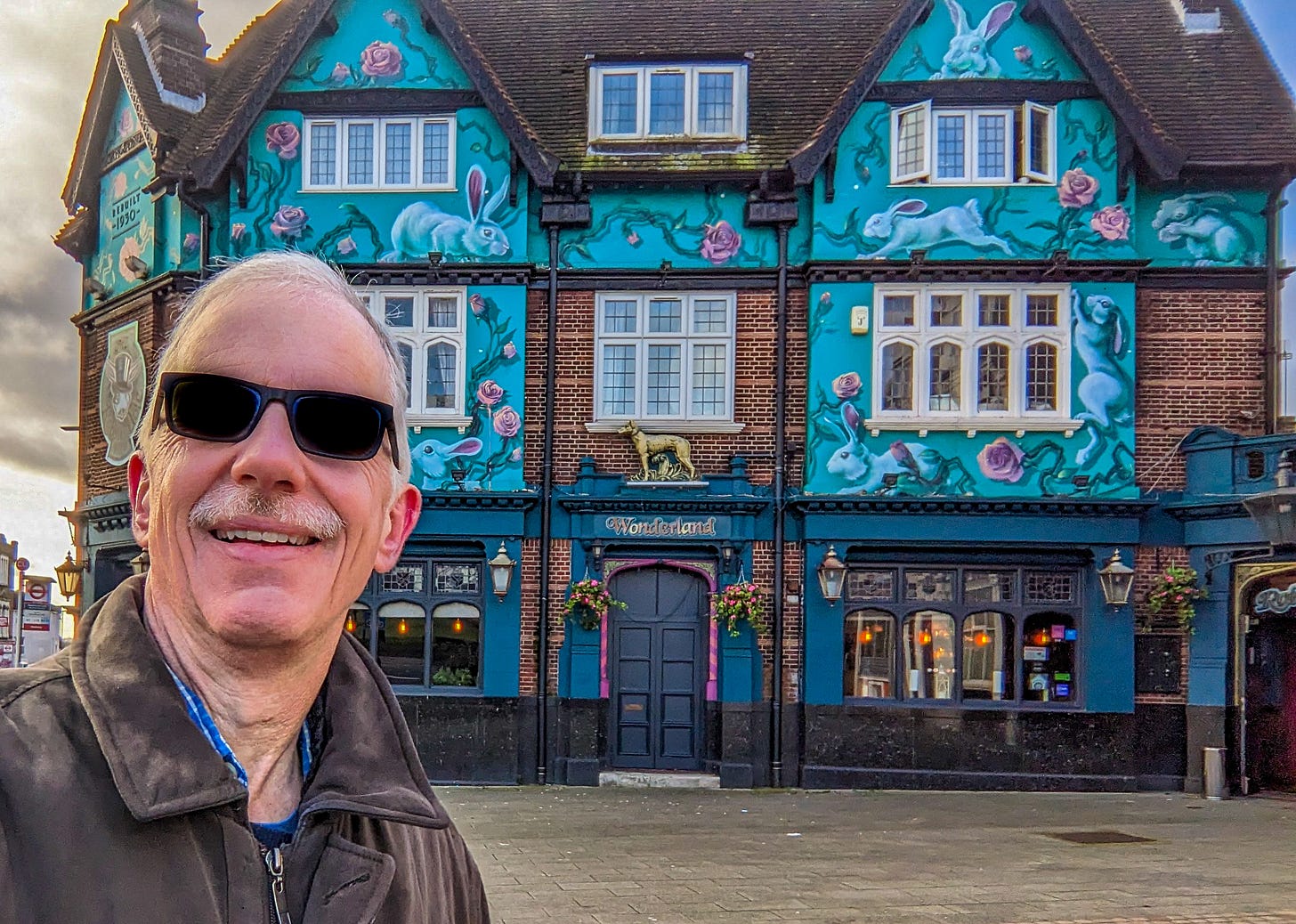

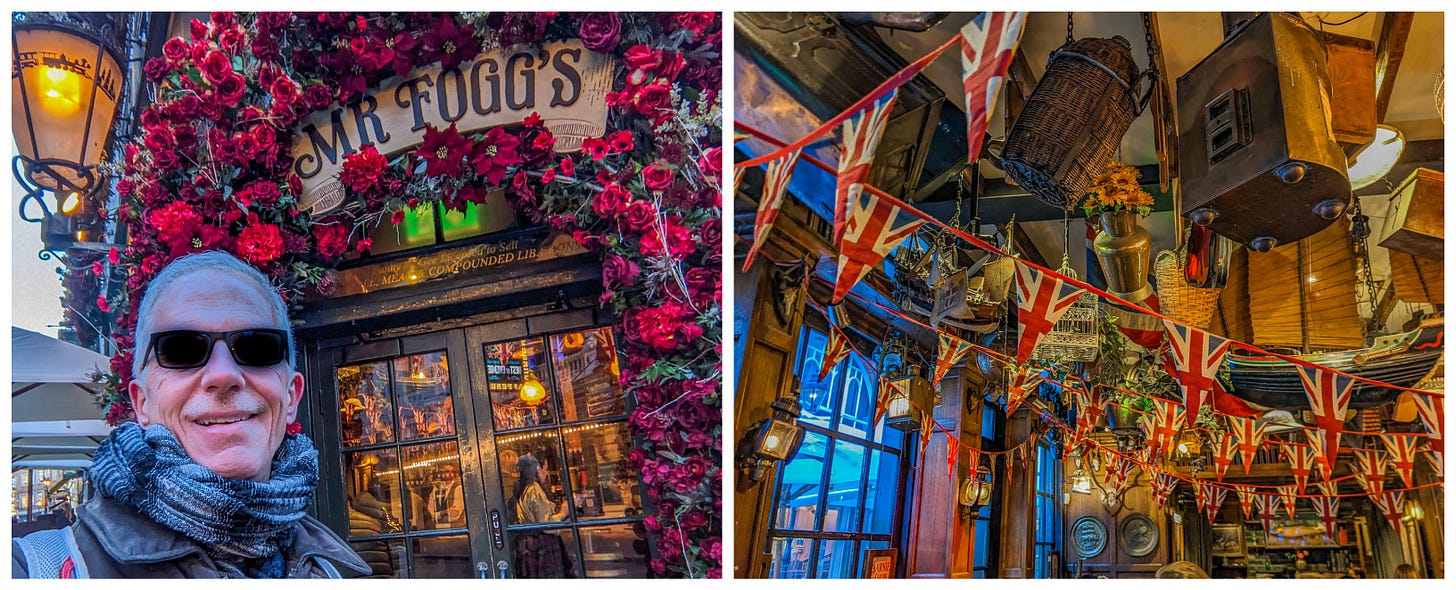
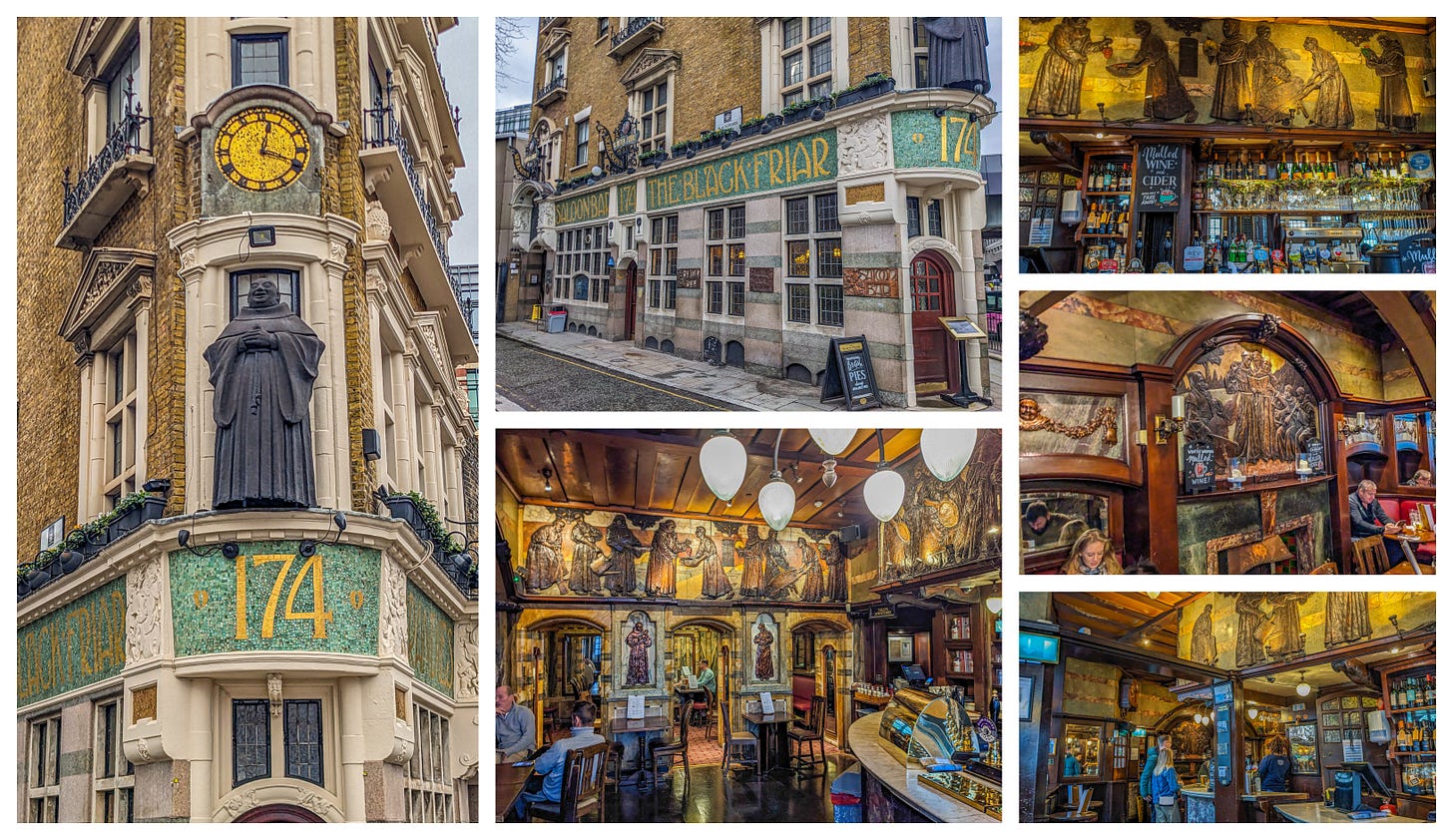

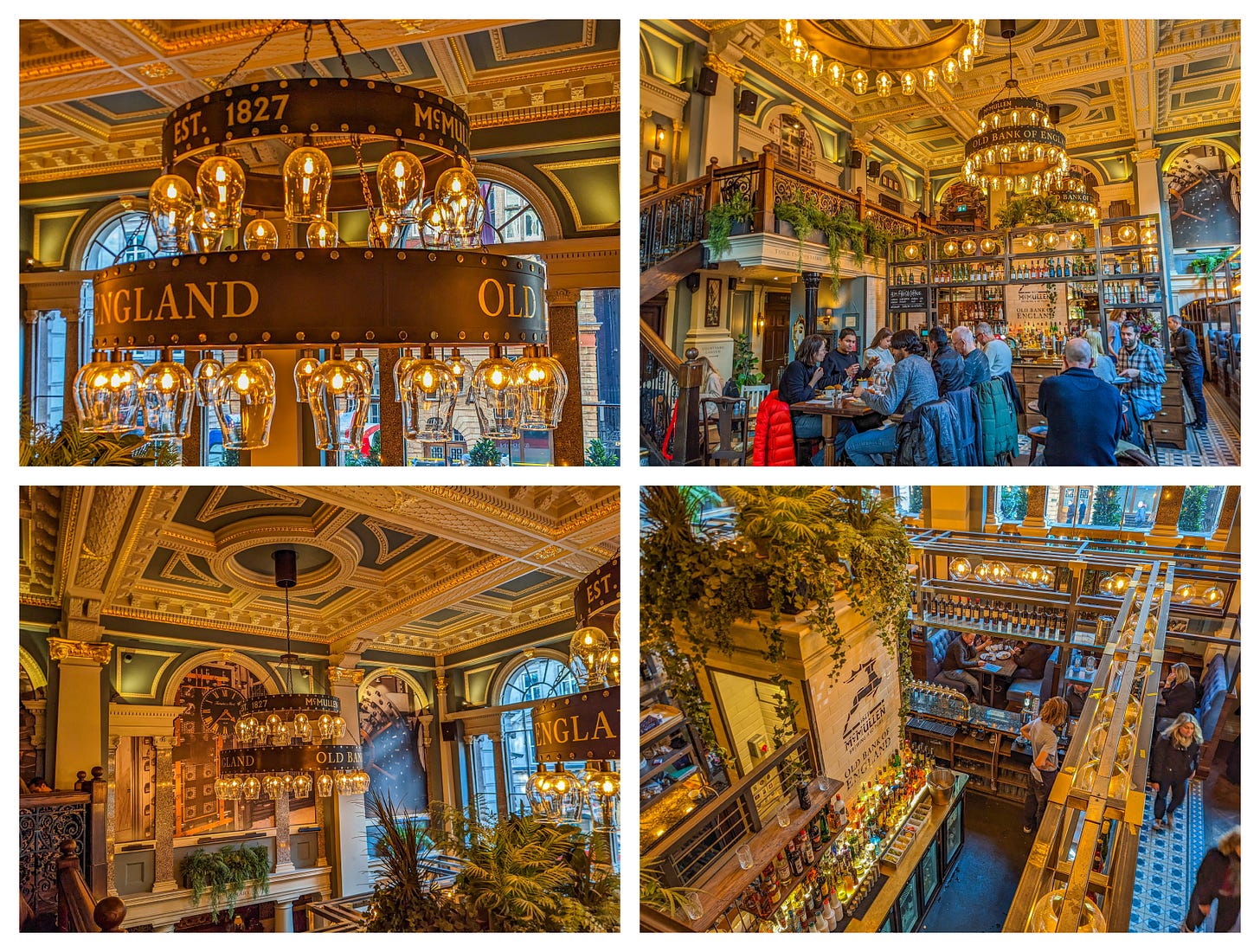
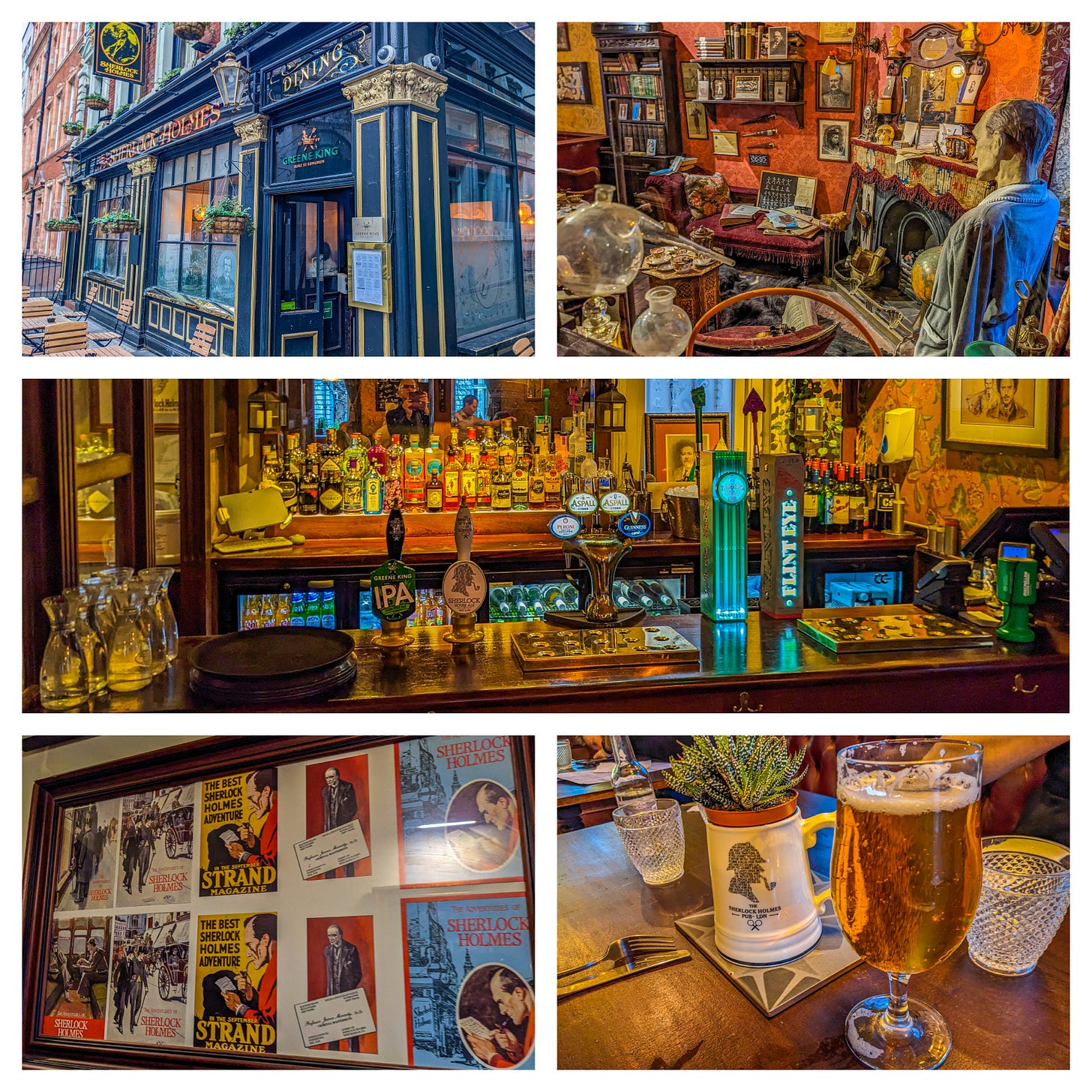
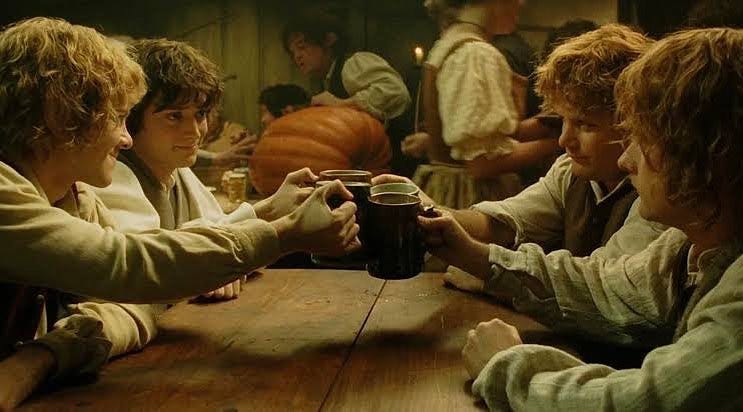
Great piece! Really enjoyed it, and it's given me lots of food for thought.
It's a complex issue, why pubs are closing. From my decade or so in the drinks trade, this is my take:
There are still pubs that are absolutely thriving in the UK, BUT only because they have innovated and kept up with the times. Too many pubs are, to put it bluntly, crap. Bad quality booze, bad food, terrible atmosphere. There are myriad reasons for this and one of the main ones is that many of our pubs are "tied" to breweries which means they have to buy not just their beer, but often ALL of their booze from that brewery. These breweries often don't have much choice and they rip their pubs off. I saw a social media post a while back from a pub that showed the receipt for beer from their brewery compared to what they could buy it in a wholesalers and they were being charged three times the price.
The result is that many pubs are highly expensive for what you get. And that obviously doesn't fly these days.
Second, I've been to too many pubs (and know too many publicans) that simply don't care. They stick on 4 or 5 what we call "slosh" lagers, maybe if you're lucky a couple of local brews on cask and the worst wine you'll ever see from the cash and carry. And that's it. They'll tell you it's what their customers want, but frankly there aren't enough of them anymore.
I went to my parents-in-law local pub this Christmas and it was all Nescafe instant coffee and terrible beer and sexist sayings written on the walls. It wasn't very young-person friendly. As a Millennial, I don't buy that we don't drink! We absolutely do. But many of us are looking for quality. Tap rooms linked to craft breweries are thriving right now, as are the sort of wine shop / bar hybrid that I owned. Most pubs simply don't offer that quality, and often the prices for the crappy lager are the same (there or thereabouts) as the craft brewery down the road, so we head there.
There are pubs that have made it work. Good food, a good wine list, good beer (most of them are not tied to a brewery so they have more freedom but there are exceptions). Next time you're in London you should check out my friend's place The Draper's Arms in Islington - it's an amazing example of what a good pub can look like. There's also the Sun Inn in Dedham, Essex and the most famous pub of them all, The Sportsman in Kent.
As for the smoking ban and France booze cruises, I think these are far too long gone to make any kind of difference. The ban happened nearly 20 years ago! And French booze cruises haven't worked in many years thanks to the rising cost of the tunnel, ferries and petrol, and was only ever available to people living in the South of England anyway.
Personally, I'm sad the pubs are closing across Britain. Like all Brits, they were (and still are when I'm in the country) a big part of my life. You're right, as an institution, they're amazing. But in many cases, they could do better.
Wonderfully researched article! I will definitely check out the Rabbit Hole. AinW trivia is a minor passion ever since I played her in high school.